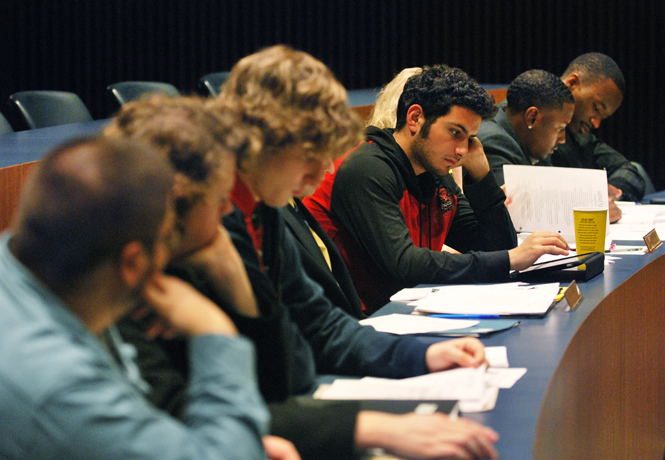Does USG represent student body?
Omar Nemer, senior Honors College senator, works on his iPad during Wednesday night’s USG meeting. The senators and directors talked about lobbying at the Columbus State House March 16th for issues pertaining to Kent State.. Photo by Phil Botta.
The Undergraduate Student Government is a committee that stands before Kent State with the goal of representing the undergraduate student body as a whole.
Every spring, students can vote in USG elections to decide which individual senator will represent their respective college and which nine directors will represent the entire student body.
“The candidates in the elections are elected by their peers,” said Justin Pierce, USG executive director and senior finance major. “They campaign with the intent that they’re going to represent their contingencies.”
USG tries to incorporate student opinions and the students’ best interests when making decisions.
However, some students know little about USG and what the organization is used for. Brandon Verhovec, sophomore pre-accounting major and Amber Grieneisen, sophomore art education major, both said they knew of events, such as concerts, that had taken place at the university, but did not know USG was responsible for making them happen.
Katie Johnson, junior pre-nursing major, said she knew about the Flashfleet bike rental program last fall from working at The Quad desk area in the Honors College. “I would tell people about it, but I had no idea that it was USG who did it,” Johnson said.
When USG takes on new tasks, it sends out surveys asking for student opinions on what it is doing. The most recent university-wide survey, which included undergraduate and graduate students, received a 5.71 percent response, “which I heard is pretty good,” Pierce said.
Kim Reardon, junior pre-nursing major, said she didn’t know what USG stood for or represented. If she knew more about it, she said she would vote in the upcoming election to put her opinion in.
Pierce said he frequently asks the college senators to be available to their colleges by interacting with as many students as possible, as well as obtaining student opinions. They talk about current issues happening within the colleges, and they consult with students about events taking place.
Torrie Emanuel, freshman photojournalism major, said she heard about USG during welcome weekend but hadn’t heard about it since. She said she thinks there should be more than one senator per college.
“It would be better to have more representation because it would lead to more student opinion,” Emanuel said.
When Pierce attends administration meetings, he said he only gives his stance on current topics for the student body when he is confident enough that what he is passing on is what the student body wants. If he is a little unsure, he will withhold his opinion.
“It’s pretty daunting to give an opinion that’s representative of the whole student body,” Pierce said. “So I think myself; I’m fairly responsible with that.”
Andrew Albaugh, sophomore electronic media major, said he wished he knew more about what USG was doing.
“I would like the minutes available to be more known, so I know where my money is going to,” Albaugh said.
As a whole, USG gathers biweekly at meetings open to the public Wednesdays at 5 p.m. in the Governance Chambers.
Directors meet every week. The minutes and a video of the meeting are posted on its website.
About four years ago, USG went through a review. Today, there are 25 senators and directors , whereas there were previously nine directors and no senators.
By adding more representation in the student government, “I believe we’ve taken it to a different level,” said Donna Carlton, USG faculty advisor and assistant director of Center for Student Involvement. “Any time you have more representatives in such a large university, it brings in other student opinions.”
Carlton said that ever since these changes occurred, there seems to be more interaction between USG and the deans of the different colleges.
“It’s become a win-win,” she said. “Information sharing is so important at such a large place like this.”
Both Verhovec and Grieneisen said they did not know that one student represented their individual colleges.
After learning about USG, Verhovec said he thinks it’s a good idea to have representation.
Between balancing schoolwork, e-mails, extracurricular activities and USG work, “you just have to trust yourself and the fact you were elected to represent,” Pierce said. “There’s always room for improvement. Everyone has a long way to go. The U.S. economy, the U.S. government, USG here at Kent State — everyone.”
Contact Caitlin Restelli at [email protected].



